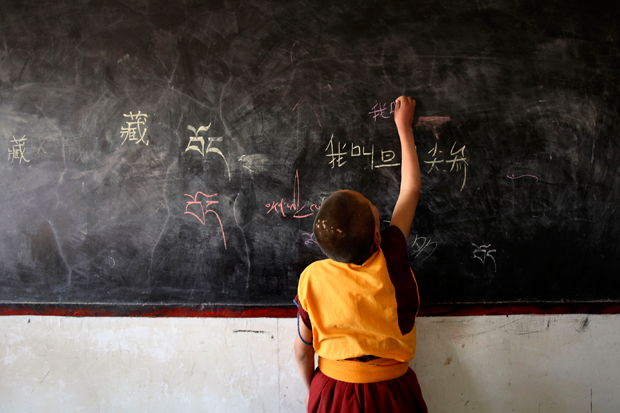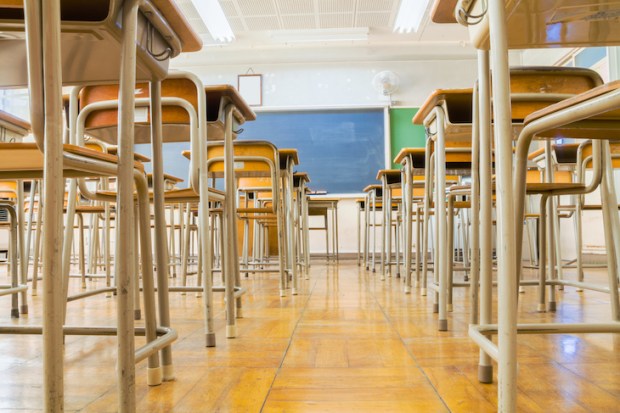Watching a group of unruly children make mincemeat out of a well-meaning teacher has become a television staple and Are Our Kids Tough Enough? Chinese School, a factual entertainment series that debuted on BBC2 on Tuesday, is a case in point. We look on aghast as five teachers from China struggle to manage a class of ordinary 14-year-olds in England. They quickly discover that the techniques that have made Chinese schoolchildren the envy of the world don’t work with Kevin the Teenager.
On the face of it, the Chinese educational model has much to recommend it. Shanghai is at the top of the Pisa international education league tables in maths, while the UK is in 26th place. Children from disadvantaged backgrounds are two and a half years ahead of their British equivalents and outperform the children of British professionals. It seems we could learn a great deal from Chinese teachers, particularly in boosting the performance of our lowest achievers.
So why does it all go pear-shaped when they try to ply their trade at Bohunt School, a comprehensive in Hampshire? Bohunt is a pretty good school by English standards. Last year, 87 per cent of pupils got five GCSEs with grades A* to C, including maths and English, way above the national average of 52 per cent. Yet when Yang Jun, a teacher from Xian in central China, tried to teach his class some basic science, they seemed incapable of paying attention. While Chinese children would be sitting quietly in rows, hanging on his every word, their English equivalents preferred to chat about One Direction and what they saw on TV last night.
‘In China, we don’t need classroom management skills because everyone is disciplined by nature, by families, by society,’ he said. ‘Whereas here it is the most challenging part of teaching.’ Part of the problem is that nearly all Chinese pupils place a high value on education, seeing it as their ticket to a better life, while a significant minority of English teenagers don’t. This leads to a great deal of low-level disruption, which was singled out as a problem by Ofsted chief Sir Michael Wilshaw last year.
One Chinese teacher at Bohunt School blamed our over-generous welfare system. ‘Even if they don’t work, they can get money, they don’t worry about it,’ said Wei Zhao. ‘But in China they can’t get these things so they know, “I need to study hard, I need to work hard to get money to support my family.” If the British government really cut benefits down to force people to go to work they might see things in a different way.’
Another difficulty is that, in the words of the programme’s narrator, ‘Chinese education is based on authority, discipline and ruthless competition’, whereas our system is more progressive and child-friendly. Few English schoolteachers expect teenagers to give them their undivided attention if they engage in the traditional, teacher-led approach that is still the norm in China. They are trained to keep children permanently stimulated with quizzes, role-play games and ‘key word bingo’. Even at an above-average school such as Bohunt, children don’t receive what the Chinese would recognise as an education. It’s a hybrid of education and entertainment — edutainment. It’s the difference between an old-fashioned public information film and Horrible Histories. Even the headteacher of Bohunt dismissed the Chinese teaching style as ‘mind-numbingly boring’.
In fairness to English teenagers, there’s little proof that this approach works for all Chinese schoolchildren beyond anecdotal evidence provided by these teachers. Yes, the data from Shanghai is impressive, but teenagers in the rest of mainland China don’t sit the Pisa tests and there are good reasons for treating the Shanghai data with a pinch of salt.
Until recently, the children of migrants from less developed areas weren’t allowed to attend the best schools in Shanghai, which were reserved for the city’s elite. The ban was lifted in 2008, but only for primary and middle schools, i.e. for pupils aged 14 and under. The Pisa tests are taken by 15-year-olds. The children tested in Shanghai are the equivalent of grammar-school kids in England, so it’s not surprising that they’re several years ahead of English children as a whole. If you compare like with like, the gap is much smaller.
If there’s an enduring lesson here, it’s that child-centred teaching methods aren’t as effective as the traditional, chalk-and-talk approach favoured in China. But we don’t need a factual entertainment series to tell us that.
Got something to add? Join the discussion and comment below.
Get 10 issues for just $10
Subscribe to The Spectator Australia today for the next 10 magazine issues, plus full online access, for just $10.
You might disagree with half of it, but you’ll enjoy reading all of it. Try your first month for free, then just $2 a week for the remainder of your first year.















Comments
Don't miss out
Join the conversation with other Spectator Australia readers. Subscribe to leave a comment.
SUBSCRIBEAlready a subscriber? Log in